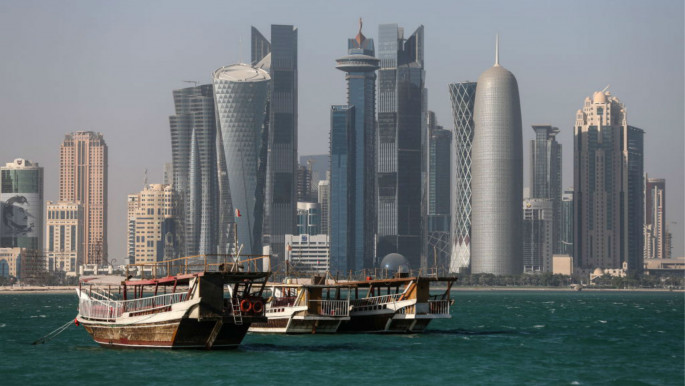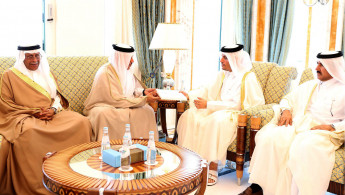Did this year's GCC summit help bridge Gulf differences?
Promising to be a significant event, the 40th session of the Gulf Cooperation Council (GCC) summit was held in Riyadh on Tuesday.
Established in 1981, the immediate goal of the GCC was to protect the region from threats in the aftermath of the Iran-Iraq war.
Comprising of Bahrain, Qatar, Kuwait, Oman, Saudi Arabia and the UAE, the GCC structure is a lot like that of the European Union (EU) as it encourages the political and economic integration of member states. In 2009, steps were taken to issue a joint currency similar to the EU pattern, but the UAE and Oman did not agree.
Having a security aspect as well as various defence, internal security and counter-terrorism agreements between member states, the mechanism provides for a standing coalition land force of around 4,000 forces representing all six nation-states.
However, the alliance is at a decisive juncture right now.
Since 2017, the GCC unity has been badly fractured over a political dispute and the ensuing diplomatic crisis has endangered its relevance, credibility and existence.
Enforcing a land, sea and air 'blockade' on Qatar after various disagreements, the states of Saudi Arabia, UAE, Bahrain and Egypt unsuccessfully tried to make Doha fall in line with their regional stance.
 |
|
| Read also: Challenges to resolving the GCC crisis |
Opting to remain neutral, both Oman and Kuwait stayed out of the spat while the latter has tried to mediate between Qatar and the blockading states.
Read also: The Qatar blockade killed the GCC, but what next?
Contradicting the basic ethos of the power bloc, these ongoing divergences rendered the alliance almost dysfunctional and confidence building measures are needed to renew trust.
Expecting that this year's GCC summit might become an important turning point, all eyes were on developments in Riyadh.
According to the Foreign Minister of Kuwait, the event would prove to be a "milestone" and the differences between the "Gulf brothers" will be sorted out at the summit.
 |
The event would prove to be a 'milestone' and the differences between the 'Gulf brothers' will be sorted out at the summit |  |
Although Qatar's emir skipped the summit, in a sign of the changing mood, the Doha delegation received a warm welcome in Riyadh, with Saudi Arabia's King Salman and the Qatari prime minister exchanging smiles and pleasantries.
"The people of Qatar, welcome, to your second country," said the commentator on Saudi state television, in a friendly greeting.
In his speech, King Salman did not address the Qatar dispute directly but called for Gulf unity in the face of threats including "aggressive acts" by Iran.
GCC secretary-general Abdullatif Al-Zayani also called on Gulf nations to remain "integrated and intertwined", stressing the need for "cohesion".
There have also been some de-escalatory steps taken in the last few months. To begin with, the missile attacks on Saudi Aramco oil facilities forced Riyadh to look for regional support. An emergency GCC summit was held in Mecca in May to "discuss the aggressions and their consequences."
In the first high-level visit since the Gulf spat, the Prime Minister of Qatar, Abdullah bin Nasser bin Khalifa Al Thani arrived in Saudi Arabia and the GCC started looking functional again.
Read also: Mecca summits will not end the Gulf crisis
Second, according to media reports, the Qatari Foreign Minister Sheikh Mohammed bin Abdulrahman Al Thani visited Riyadh in November. Not confirming when or where negotiations took place, the Foreign Minister recently expressed hopes that talks would end the ongoing impasse, stating that, "We have moved from a stalemate to some progress where... some talks took place between us and specifically Saudi."
Third, alongside, the GCC annual summit scheduled to be held in the UAE since last year got changed to Riyadh soon after Thani's visit, signalling that this may be due to productive negotiations.
Fourth, soon after that, Saudi Arabia, UAE and Bahrain ignored their own blockade of Doha and sent their national teams to play in the prestigious 2019 Arabian Gulf Cup held in Qatar the previous week. Hosting the semi-finals of the same tournament, Saudi Arabia will also welcome all participants this week.
Finally, for Tuesday's summit, Saudi Arabia's King Salman sent a written invitation by hand with the secretary-general of the GCC to Qatar's foreign minister recently. It is not the first invite since the Gulf crisis but there are better chances of a positive response.
At the end of the day, a lot depends on Doha. Ostensibly, it is in a much better situation now than it was before the regional boycott was implemented against it in 2017. The general impression was that it could not survive regional isolation for long and it would relent.
But Qatar has proved more resilient, not only did it manage to survive, it managed to avoid any domestic instability or financial upheaval.
 |
Qatar has proved more resilient, not only did it manage to survive, it managed to avoid any domestic instability or financial upheaval |  |
Carving out its own space in regional geopolitics and focusing on its economy and trade relations with other countries, it seems quite satisfied with its independent stance.
Facing increased business and travel costs, Doha stepped up trade and security links with other countries and got over most of the difficulties caused by the boycott. In addition, several sustainable dairy and meat farm schemes were initiated in order to survive blockades as it used to rely on imports for 90 percent of its food in the past.
According to a recent International Monetary Fund (IMF) report, Qatar's economic performance improved in 2018. It says, "Qatar's economy has successfully absorbed the shocks from the 2014-16 drop in hydrocarbon prices and the 2017 diplomatic rift. Real GDP growth is estimated at 2.2 percent, up from 1.6 percent in 2017."
Trying to diversify and stabilise their sources of revenue due to erratic oil prices, the states which boycotted Qatar now miss a united, functional, viable GCC where members work with closer co-ordination, enforcing similar reforms, taxes and economic policies.
Holding half of the global oil reserves between them, the long-term vision of the GCC states is to expand beyond the energy sector into new fields such as tourism, finance and construction to ensure economic stability.
Even though the IMF projected a favourable growth outlook for the GCC in 2018, there are some challenges for the region. For example, Bahrain remains vulnerable due to high debt levels and other variables.
Nevertheless, it is Riyadh which seems more interested in normalising relations than the other three states. As American Senator Chris Murphy from the US Senate Foreign Affairs Committee recently observed, "At the very least, I think the Saudis seem sincere in trying to figure out the path forward."
Therefore, it would be premature to say that this year's GCC summit has ended the rift, but it was more productive than the one in 2017 which lasted just two hours instead of two days.
But if the blockade stays in place, no lasting results can be expected and most of the other optics would be purely symbolic.
Sabena Siddiqui is a foreign affairs journalist, lawyer and geopolitical analyst specialising in modern China, the Belt and Road Initiative, Middle East and South Asia.
Follow her on Twitter: @sabena_siddiqi



